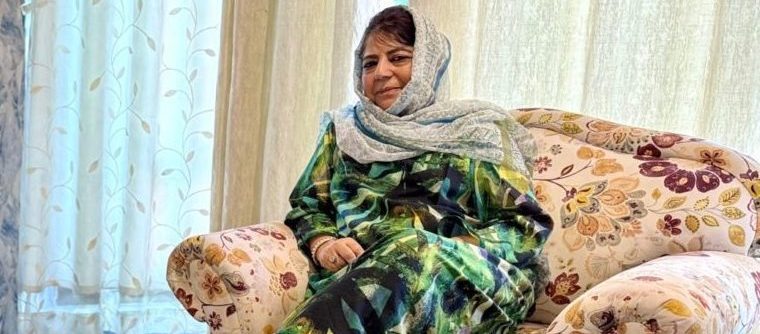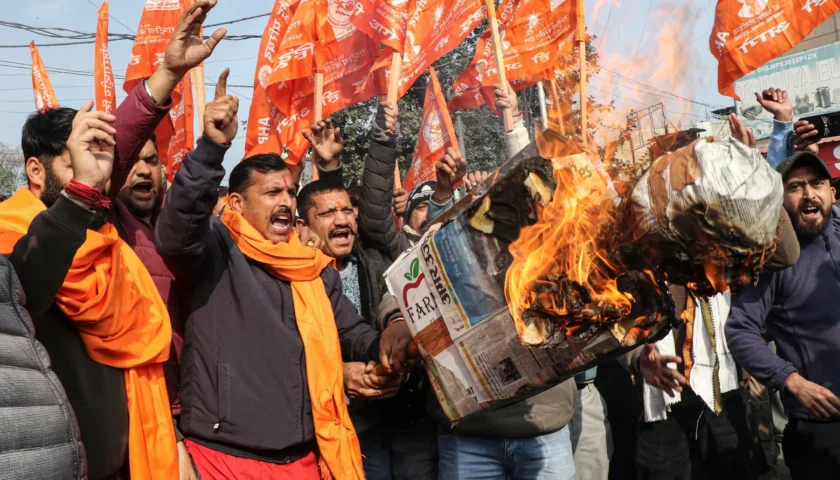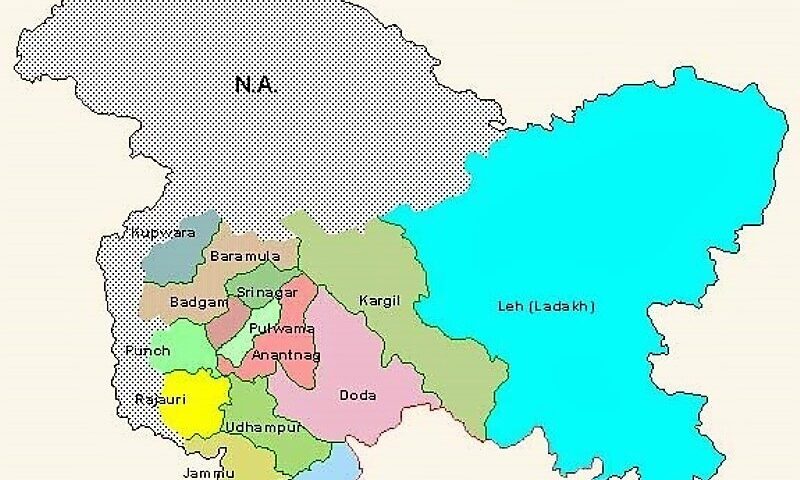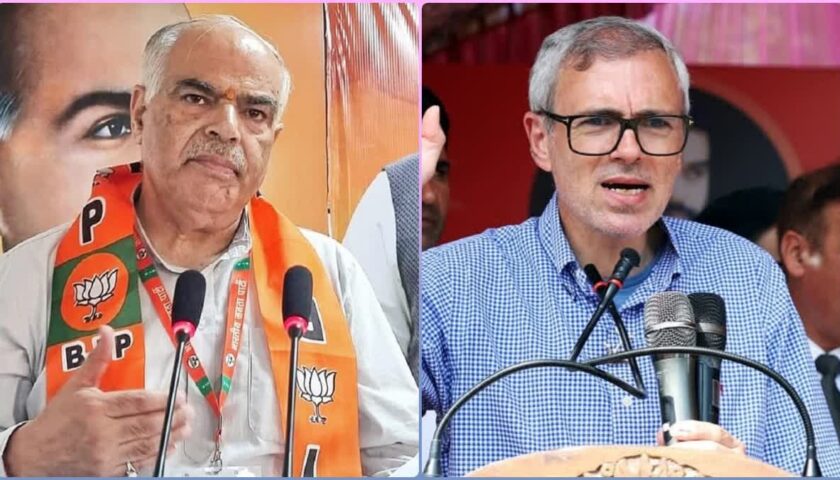Mehbooba Mufti on Mehraj Malik’s Detention: A Political Diversion from Hazratbal Outrage
By: Javid Amin | 10 September 2025
Politics, Religion, and Democracy Collide in Jammu & Kashmir
In the politically volatile landscape of Jammu and Kashmir (J&K), issues of governance often intertwine with religion, identity, and public sentiment. The latest controversy revolves around the detention of Mehraj Malik, president of the Aam Aadmi Party’s J&K unit, and the Hazratbal shrine plaque outrage that shook the Valley.
Former Chief Minister Mehbooba Mufti has accused the administration of deliberately using Malik’s detention as a diversionary tactic to draw attention away from the deeply sensitive Hazratbal issue. According to her, the government is prioritizing political suppression over disaster relief and public accountability—sending a dangerous message about the state of democracy in the region.
This article takes a comprehensive look at the events, the symbolism of Hazratbal, the controversial use of the Public Safety Act (PSA), and what these moves reveal about the future of politics in Jammu and Kashmir.
The Allegation: A Diversion from Hazratbal
Mehbooba Mufti minced no words when she alleged that the detention of Mehraj Malik was a scapegoating exercise.
She argued that the real reason behind Malik’s arrest was not law and order but rather a calculated political strategy:
“Instead of addressing the people’s outrage over Hazratbal, the government chose to target an elected representative. Mehraj Malik has been made a scapegoat.”
At the heart of the controversy lies the Hazratbal shrine, one of the holiest sites in Kashmir, revered by Muslims across the subcontinent. When a plaque bearing the Ashoka emblem—installed by Darakhshan Andrabi, a senior BJP leader and Waqf Board Chairperson—was unveiled at the shrine, it triggered an immediate backlash.
Protesters viewed it as an unacceptable politicization of a sacred space. Demonstrations broke out, more than 50 people were arrested, and emotions ran high in a Valley already weary of political instability.
Mehbooba’s argument is that instead of engaging with the anger around Hazratbal, the administration attempted to redirect public focus by detaining Malik.
Hazratbal Shrine and the Politics of Faith
To understand why the Hazratbal incident provoked such a strong response, one must first appreciate the spiritual and cultural significance of Hazratbal.
Hazratbal: The Heart of Kashmiri Faith
-
Located on the banks of the Dal Lake in Srinagar, Hazratbal is home to the Moi-e-Muqqadas, believed to be a hair strand of Prophet Muhammad (PBUH).
-
For centuries, Hazratbal has been a symbol of Kashmiri identity, spirituality, and resistance.
-
It has often stood at the intersection of religion and politics, especially during periods of unrest.
Why the Plaque Became Controversial
The installation of a government-style Ashoka emblem plaque inside the shrine premises was perceived as an intrusion into a religious space.
-
Critics argued it was an attempt by the BJP to assert political authority over sacred institutions.
-
The choice of Andrabi, a BJP leader, to inaugurate it made the move look politically loaded.
-
Locals saw it as a disrespectful imposition of state symbolism in a place meant solely for devotion.
The incident reflected broader anxieties about the state’s interference in religious institutions in Kashmir, where identity and faith are inseparable from politics.
Mehraj Malik’s Detention: A Political Move?
The government’s official stance was that Mehraj Malik was detained under the Public Safety Act (PSA) for “disturbing public order” in his home district of Doda. He was subsequently shifted to Kathua jail.
What is the Public Safety Act (PSA)?
-
Enacted in 1978, the PSA allows authorities to detain individuals without trial for up to two years.
-
It has often been described as a tool of political suppression in Kashmir.
-
Human rights organizations have consistently criticized its vague provisions, which allow detention on flimsy grounds.
Why Mehbooba Mufti Called it “Excessive”
Mehbooba Mufti acknowledged that Malik might have used strong language in his political speeches. But according to her:
-
Resorting to PSA for an elected representative was unprecedented and undemocratic.
-
Instead of debate and dialogue, the government opted for coercion and silencing dissent.
-
The move was clearly politically motivated, aimed at weakening opposition voices.
By detaining Malik, the government sent a message that even mainstream political actors are not safe from punitive action.
Doda Floods: The Ignored Crisis
Adding to the controversy is the timing of Malik’s detention. Just days earlier, Doda district was reeling from devastating floods. Homes were destroyed, farmlands submerged, and families displaced.
Mehbooba Mufti questioned the government’s priorities:
-
Why was Malik, the local MLA, not allowed to work with his constituents in a time of crisis?
-
Why was the administration focusing on detentions and FIRs instead of flood relief and rehabilitation?
Her remarks struck a chord with many Kashmiris, who felt abandoned by institutions during the disaster. The detention appeared to reflect misplaced priorities, further alienating the public.
The Larger Context: Freedom of Expression in Kashmir
This controversy is not just about one leader or one shrine—it speaks to the larger crisis of free expression in Jammu and Kashmir.
-
Journalists have been detained or harassed for reporting critically.
-
Civil society organizations face restrictions.
-
Political leaders across the spectrum are routinely put under house arrest or preventive detention.
Mehbooba Mufti’s call to withdraw FIRs linked to the Hazratbal protests and to release Mehraj Malik is, therefore, not just a political demand but a plea for democratic space in a region where dissent has long been criminalized.
Mehbooba’s Political Strategy: Reviving PDP’s Voice
For Mehbooba Mufti, this controversy is also an opportunity to reclaim political space for her party, the Peoples Democratic Party (PDP).
-
The PDP has been struggling since its coalition with the BJP collapsed in 2018.
-
Many of its senior leaders defected or went silent after the abrogation of Article 370 in August 2019.
-
By championing civil liberties and religious sentiments, Mehbooba seeks to reconnect with the Valley’s masses.
Her strong statements are not just criticism but also part of a broader political comeback strategy.
Call to Action: Mehbooba’s Demands
In her concluding remarks, Mehbooba Mufti made two clear demands:
-
Withdraw FIRs and cases related to the Hazratbal protests.
-
She argued that prosecuting protesters for defending their faith was unjust.
-
-
Release Mehraj Malik from detention.
-
Calling his detention “politically motivated,” she urged the administration to respect democratic processes.
-
She warned that suppressing voices of dissent would only deepen resentment and destabilize the fragile peace in Jammu and Kashmir.
Conclusion: A Test for Democracy in Jammu and Kashmir
The twin controversies of Hazratbal outrage and Mehraj Malik’s detention have once again exposed the fragile state of democracy in Kashmir.
-
Faith and politics remain deeply entangled.
-
The Public Safety Act continues to be wielded as a weapon of control.
-
Leaders like Mehbooba Mufti are framing the debate as a struggle for dignity, democracy, and identity.
Whether the government rethinks its approach—or doubles down on repression—will shape not only the political future of J&K but also the credibility of Indian democracy in the region.




